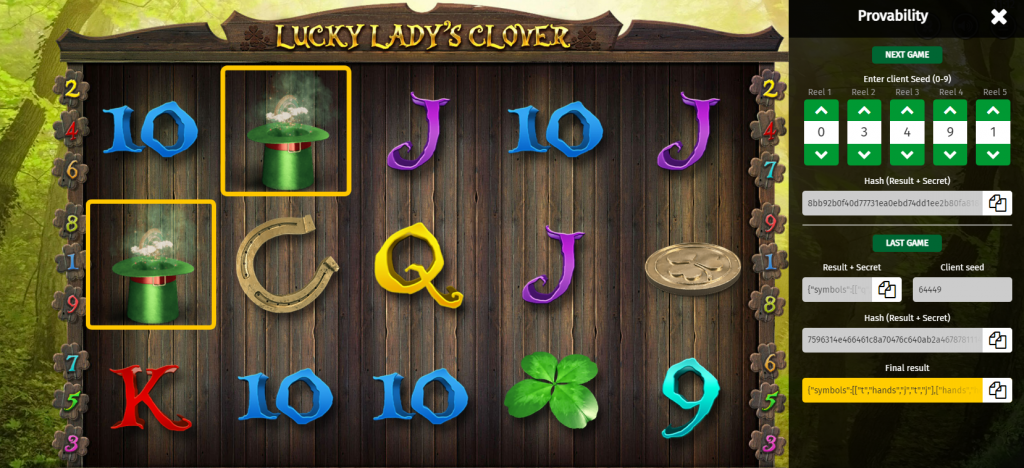As an iGaming operator, getting a clear handle on what Provably Fair means can make a real difference in how you run your games. In this article, we’ll walk you through the origins of Provably Fair, give you straightforward examples of PF in action, and introduce you to the pioneers of PF games. By the end, you’ll have a solid understanding of PF in iGaming and why it matters to your operations – helping you ensure fairness and gain your players’ confidence.
What is Provably Fair in IGaming?
Provably Fair (PF) is a term that’s become increasingly important in iGaming. At its core, it’s a system that allows players to verify the fairness of each game they play. This transparency helps to build trust between players and operators by ensuring that the games haven’t been unfairly manipulated in the casino’s favour.
The Origins of Provably Fair Gambling
The concept of Provably Fair systems first emerged in the context of online games like dice or crash gaming sites. These sites generally attracted more tech-savvy players who had the know-how to question and verify the fairness of the games. Their early acceptance of provably fair technology is a testament to its reliability. These players weren’t just users; they were advocates for fairness, setting a standard for trustworthiness in iGaming from the very beginning.
The Meaning and Impact of Provably Fair for iGaming Operators
For iGaming operators, embracing Provably Fair means more than just adopting a new system; it’s about making a commitment to complete transparency and fairness.
This technology allows operators to demonstrate to their players that each game result is fair and not predetermined. This transparency is particularly significant in an industry where trust is paramount.
Additionally, as more game providers adopt and prioritise Provably Fair technology, these games have gradually become more robust, allowing for a higher level of security and transparency.
While these games appeal particularly to crypto-first players – usually familiar with the ins and outs of blockchains – they may still be a niche concept for traditional ‘fiat’ players. This distinction highlights the system’s value in ensuring fair play, and, consequently, in building trust among a specific player base.
As a result, PF technology not only enhances confidence in the games; it also strengthens the reputation of online casino platforms and casino brands, especially among the crypto-gaming community.
Understanding Provably Fair Algorithms
BGaming, a SOFTSWISS subsidiary, has been at the forefront of integrating Provably Fair algorithms in iGaming. In this section, let’s dissect their approach, simplifying the complex mechanisms for clarity.
Key Components of a Provably Fair System
First off, in the Provably Fair system, several key components work together to ensure transparency and fairness. Understanding these elements is crucial for appreciating how PF technology operates:
- Player Seed: Before playing a game, a player generates a unique number, known as the ‘player seed’. This can be chosen by the player or randomly generated by the game.
- Server Seed: The game server generates a separate number, the ‘server seed’, which is kept hidden from players to ensure security and prevent manipulation.
- Nonce: Starting from 0 or 1, the ‘nonce’ is a number that changes with every bet. In simple terms, it makes sure each game round is unique and fair by keeping results random and independent from previous rounds, ensuring honesty in every game.
- The Use of SHA-256: SHA-256, a cryptographic hash function, is used to secure the combination of the Result (the game outcome) and Secret (a random string generated each round), ensuring the integrity and unpredictability of game outcomes.
In a nutshell, these components form the foundation of the PF system, creating a secure and transparent iGaming environment.
BGaming’s PF Process – a Detailed Look
BGaming’s introduction of a Provably Fair feature is geared towards increasing trust between player and casino. This feature is what sets their PF system apart. Here’s a look at Provable Fairness as described by a game provider:
- Pre-Game Calculation: BGaming calculates the game outcome (the Result) and generates a random string (the Secret) for each round.
- Hash Creation: The combination of Result and Secret is hashed using SHA-256, creating a secure hash passed to the player.
- Player’s Role: Players input their Client Seed before the bet, influencing the game’s outcome without pre-determining it.
- Gameplay and Verification: The gameplay unfolds based on these inputs. Once completed, players receive the Result, Secret, and Final Result for verification. The final result can be verified both in-game and using an independent hash generator.
Practical Application in Games
BGaming’s implementation of Provably Fair algorithms isn’t just theory though; it’s actively used in their provably fair roulette and provably fair slots, as well as their card games. This practical application allows their players to verify the fairness of each game round.
Notably, popular titles such as ‘Aztec Magic Deluxe’ and ‘Lucky Lady’s Clover’ clearly demonstrate the use of this technology.

Provably Fair technology in BGaming’s ‘Aztec Magic Deluxe’.

Provably Fair technology in BGaming’s ‘Lucky Lady’s Clover’.
This kind of complete openness is a significant factor in ensuring player trust and game integrity – highlighting BGaming’s commitment to enhancing the iGaming experience with reliable and transparent gaming solutions.
Is Provably Fair Hackable?
One of the biggest questions about provable fairness is usually: Can someone hack it and effectively ‘cheat’ the system?
The simple answer is that it’s highly improbable. Here’s why:
1. Server Seed: Well-Protected
The server seed is a critical component in PF algorithms. Used by provably fair casino game providers, it’s protected by advanced hashing techniques, which convert the seed into a unique set of characters.
This process ensures that even if someone intercepts the hash, they can’t reverse-engineer it to discover the original server seed. Interestingly, cracking SHA-256’s complex encryption is so complicated that it’s speculated only a future quantum computer could possibly achieve it – something still likely decades away from reality.
2. Player Seed: Kept Safe
The player seed, chosen or generated by the player, is also securely handled. Online casinos have stringent data protection agreements in place to safeguard player data. This means that any third parties – including potential hackers – are unable to access the player’s seed or manipulate it in any way.
In short, these layers of security in both the server and player seeds contribute significantly to the strength of PF algorithms, making them resistant to pretty much any form of hacking attempts.
Top Provably Fair Game Providers
As we’ve seen, Provably Fair (PF) technology marks a significant advancement for transparency and fairness in iGaming.
As a leader in the industry, SOFTSWISS collaborates with a wide range of PF game providers via the SOFTSWISS Game Aggregator. Let’s take a closer look at some of these leading providers, known particularly for their commitment to PF games:
Spribe

Spribe stands out in the iGaming industry with its innovative approach, blending social and interactive elements in their games since 2018. Based in Kyiv, Ukraine, they specialise in creating engaging and dynamic games that resonate with a modern audience, particularly in the casino and sportsbook sectors.
Top PF Games:
- Aviator: A trailblazer in social multiplayer games, Aviator features an escalating multiplier curve that could crash any moment, offering a thrilling experience. Its simplicity and the rush of deciding when to cash out before the plane flies away have made it a hit, especially in crypto casinos.
- Mines: This game cleverly mixes anticipation with strategy. Players navigate a field filled with stars and hidden mines, aiming to uncover as many stars as possible without triggering a mine. Each successful pick increases the winnings, and players can cash out after each turn. The game also offers an autoplay feature for customised settings, adding to its appeal.
- Keno: Drawing inspiration from classic lottery games, Keno offers players a chance to pick up to 10 numbers from a pool of 36. The excitement builds as more numbers match, with the potential for substantial wins if all 10 numbers are matched. Its straightforward yet captivating gameplay, coupled with an autoplay option, ensures Keno remains a favourite among PF game enthusiasts.
BGaming

Initially operating under the SOFTSWISS brand, BGaming emerged as an independent entity in 2018. Since then, it has grown into a formidable force in crypto gambling and Provably Fair gaming. Maintaining its close ties with the SOFTSWISS family, BGaming has notably advanced in creating captivating and fair player experiences. Their extensive portfolio, featuring over 100 diverse products from video slots to lottery games, underscores their commitment to innovation and player satisfaction.
Top PF Games:
- Aztec Magic Deluxe: This popular title transports players to an enhanced world of Aztec mysteries. The game revives the original ‘Aztec Magic’ with richer graphics and immersive sounds. Watch for symbols like the Aztec Warrior and Sorcerer Princess, which bring the ancient culture to life on the reels. The game balances exciting visuals with engaging gameplay, making it a hit for those seeking an adventurous slot experience.
- Lucky Lady’s Clover: Combining classic slot elements with Irish folklore, Lucky Lady’s Clover is a charming game that pays homage to the roots of slot gaming. It features symbols like Rainbows, Pots of Gold, and the enchanting Lucky Lady, infusing each spin with the ‘luck of the Irish’. This game is perfect for players who appreciate traditional slots but desire a touch of mystical allure.
- Multihand Blackjack: BGaming’s Multihand Blackjack offers a polished take on the timeless card game. With its elegant design and soothing music, it provides a relaxing yet engaging provably fair blackjack experience. Catering to both novices and seasoned players, this game promises high excitement and chances for big wins, making it a staple choice for blackjack fans.
Orbital

Since its inception in 2019, Georgia-based Orbital Gaming has made strides in the iGaming industry with its unique Provably Fair crash and video slots. Combining retro gaming charm with modern technology, the studio has established a reputation for innovation and security.
Top PF Games:
- Cyberdice: Cyberdice is a futuristic dice game that offers players a sci-fi-themed gaming experience. The objective is straightforward; players guess whether the roll will be higher or lower than a specific number, emphasising a blend of luck and strategy.
- Plinko: In Plinko, simplicity meets excitement. Players release a ball at the top of a pyramid board, and it cascades down to a row of stakes at the bottom. The game’s outcome depends on which stake hole the ball lands in, each offering a different potential payout.
- Stellar: Space-themed crash game featuring impressive visuals and sound effects. Players place bets before a space shuttle’s launch and watch as the game unfolds, with the aim of cashing out before any potential crash. The game offers single or dual betting options, adding an extra layer of engagement.
OneTouch

Established in 2015, OneTouch has become synonymous with superior-quality, mobile-first casino games. Their portfolio, featuring classics such as Baccarat, Blackjack, Roulette, and Poker, is tailored for intuitive play and optimal performance on a range of devices. With a global reach that includes Europe, Latin America, and the Far East, OneTouch’s games are recognised for their sleek design and smooth user experience, appealing to players worldwide.
Top PF Games:
- Baccarat: OneTouch’s Baccarat offers a seamless and sophisticated iGaming experience across all devices. The game features an intuitive 'squeeze' option for heightened suspense, perfect for seasoned players. Alongside the main gameplay, it includes popular side-bet options and detailed roadmaps like Bead Road and Big Road, enriching the traditional Baccarat experience.
- Hold’em Poker: Merging classic gameplay with modern technology, Hold’em Poker by OneTouch is a fast-paced and engaging ‘player vs house’ provably fair poker game. Designed with mobile-first users in mind, it offers a smooth experience on various devices, allowing players to strategise each move to outplay the dealer and win the pot.
- Classic Roulette: OneTouch’s take on Roulette epitomises the perfect blend of tradition and modernity in a mobile-first format. This version features high-end graphics and immersive sound effects, providing an authentic roulette experience tailored for ‘on-the-go’ iGaming. Its user-friendly interface makes it accessible and enjoyable for all roulette enthusiasts.
Turbo Games

Founded in 2020 in Tallinn, Estonia, Turbo Games has quickly become a leader in instant-play gaming. Their games, celebrated for rapid gameplay and high engagement, are built on a Provably Fair system, assuring players of transparency and fairness. With their innovative approach, Turbo Games caters to a diverse audience, significantly enhancing player retention and partner revenues.
Top PF Games:
- Turbo Plinko: Turbo Plinko reimagines a classic, inviting players to release balls down a pyramid board to land in slots with varying multipliers. The game’s unique twist lies in its ‘crazy mode’, where players can start with 5 to 10 balls simultaneously, ramping up the excitement and potential winnings.
- Turbo Mines: An innovative take on the traditional Mines game, Turbo Mines enhances the classic with visual and functional updates. Players can adjust the game field size for strategic play, choosing from 3x3 to 9x9 grids to vary the risk and excitement. The addition of a Turbo mode allows for fast-paced gameplay, enabling a consistent pattern for block opening across multiple rounds.
- Aero: This Turbo Games title elevates the familiar Crash game with an aviation twist, offering players the chance to multiply winnings up to an astounding x999,999! Featuring an auto-play mode without mandatory auto cashout and the ‘Claim Freebets’ feature for added excitement, Aero promises an exhilarating journey.
RNG Vs. PF: Comparing Fairness Mechanisms
When it comes to ensuring game fairness in iGaming, two distinct systems are commonly used; traditional Random Number Generators (RNG) and Provably Fair (PF) algorithms. Here’s a straightforward comparison:
Transparency
RNG: RNG games operate like a ‘black box’, where the game’s outcome is determined by a concealed random number generation process. Players see the result but not the underlying mechanism.
PF: In contrast, while PF gaming utilises RNG for creating seeds, its transparency comes from allowing players to interact with and check these elements. This verification process offers a clear view of the game’s fairness mechanics without fully exposing the mechanism, enhancing player trust.
Independence in Fairness Verification
RNG: These games depend on third-party labs to verify the integrity of their random number generation. Players and operators don’t participate in the verification process; they rely on and trust these external verifications to ensure the integrity of the game.
PF: PF games, however, allow both players and operators to directly check the fairness of the outcome. The provably fair random number generation system allows them to independently verify, and if needed, challenge the fairness of each round. This direct involvement underscores a more ‘collaborative’ approach to ensuring the integrity of the game.
Player Preferences and Understanding
RNG: Traditional RNG games, being more familiar, are often the go-to choice for many players who prefer straightforward gameplay.
PF: PF games offer more transparency but can be complex. Educating players on provably fair casino games and their algorithms may enhance engagement and trust in the system.
Roadblocks to Provably Fair Adoption
Despite the clear advantages of Provably Fair (PF) technology in iGaming, it faces several challenges that hinder its widespread adoption. Understanding these obstacles is crucial for advancing PF systems:
Player Adoption
Understanding Complexity: The biggest hurdle is often player understanding. PF systems, whilst transparent, can also be complex. Many players may not fully grasp how to verify game outcomes or may not see the need to engage with the verification process. Educating players about the benefits and workings of provably fair technology is vital to increasing adoption.
Traditional Preferences: Some players prefer sticking to familiar RNG-based games, and may be hesitant to try new technologies. Overcoming this requires demonstrating the tangible benefits of PF gaming in a player-friendly manner.
Technical Challenges
Implementation Complexity: Integrating PF systems can be technically challenging for some iGaming operators. Ensuring a smooth, seamless integration without affecting game performance is essential for wider acceptance.
Innovation Pace: As technology evolves, keeping PF systems up-to-date and compatible with new platforms and devices can be an ongoing technical challenge.
Regulatory Hurdles
Compliance: Navigating the diverse regulatory landscapes of different jurisdictions can be complicated. Establishing universal standards for PF games that comply with various regulations can be a significant challenge.
Regulatory Recognition: Gaining recognition and acceptance of PF systems by regulatory bodies is crucial. This involves educating regulators about the technology and its benefits for ensuring fairness in iGaming.
What’s Next for Provably Fair in IGaming?
Looking ahead, the journey of Provably Fair (PF) in the iGaming space is notably increasing. Based on current trends and technological advancements, here’s what we might expect in the coming years:
Wider Adoption and Player Education
Increasing Awareness: With ongoing efforts to educate players about the benefits and workings of PF technology, we can expect a broader acceptance and understanding amongst iGaming audiences. This acceptance will also be bolstered by wider adoption of the technology by game providers in the games they release.
Enhanced Player Trust: As more players learn and engage with PF systems, trust in iGaming platforms is likely to increase, further driving the demand for provably fair games.
Technological Growth
Integration with Emerging Tech: PF technology could join hands with other emerging technologies in iGaming, such as Web3, offering even more immersive and transparent player experiences.
Blockchain and Cryptocurrency Synergy: The synergy between PF technology and cryptocurrencies is likely to strengthen, with blockchain technology playing a crucial role in enhancing the security and transparency of PF systems.
Market Expansion and Regulatory Changes
PF Goes Global: We may see PF games expand into new markets, with increasing adoption in regions where it’s not so well-known or popular.
Regulations Catch Up: As the understanding of PF technology grows, more regulatory bodies might acknowledge and incorporate PF standards, leading to wider acceptance.
Collaborations and Partnerships
Joining Forces: Collaborations between game developers, platforms, and technology providers are likely to increase, pushing the PF system forward.
Cross-Platform Compatibility: Efforts by game providers to ensure PF games work smoothly on all their platforms so it’s easy for everyone to use, no matter where or how they’re playing.
Conclusion
Provably Fair (PF) is more than a feature; it’s a big step towards trust and openness in iGaming.
For operators, adding PF games shows a strong commitment to fair play. This isn’t just good for players; it also builds a solid, trustworthy reputation for operators.
PF technology lets players see and check that games are fair, and in today’s world, where players look for honest iGaming experiences, PF meets these expectations perfectly.
In line with these kinds of advancements, products like the SOFTSWISS Game Aggregator subtly blend diverse, fair gaming options, echoing the iGaming industry’s shift towards complete transparency and player focus.
Provably Fair isn’t just the future; it’s making iGaming better right now – shaping how operators and players view the fairness and integrity of online casino games.
Frequently Asked Questions
Is PF only for Bitcoin games?
No, PF isn’t just limited to Bitcoin games. While it gained popularity in crypto gaming, PF technology can be employed by game providers regardless of the currency used.
Can I trust a game that’s not PF?
Yes, non-PF games can still be trustworthy, especially if they use a certified Random Number Generator (RNG) and are regulated by reputable gambling authorities. However, PF games do offer an additional layer of transparency by allowing players to independently verify game fairness.
How do I check a game’s fairness?
In PF games, you can usually check fairness by accessing a feature within the game that allows you to compare the game outcome with the cryptographic hash. This verifies that the outcome was not altered or predetermined.
How do PF and blockchain/crypto connect and differ?
PF games often use cryptographic techniques similar to those in blockchain technology, enhancing transparency and security. However, PF is a specific application for ensuring game fairness, whilst blockchain and crypto are broader, encompassing various technologies and applications beyond iGaming.
What are the technological requirements for employing PF systems?
Implementing PF systems requires the integration of cryptographic algorithms into the game’s software. Operators must ensure these systems are robust and user-friendly, allowing players to easily verify any game outcomes.
How does PF impact the return to player (RTP) rates?
PF itself doesn’t directly affect RTP rates. RTP is determined by the game’s design and mathematics. PF technology simply ensures the game’s outcomes are fair and that they’re not manipulated.
Are there any downsides to PF gaming from a player’s perspective?
Some players may find the concept of PF games overly complicated, or they might not actually use the right checks to see if the game is fair. However, these are issues of player understanding rather than problems with Provably Fair technology itself.
How do regulatory bodies view PF systems?
Regulatory bodies are increasingly recognising the value of PF systems. While PF is not a requirement in all jurisdictions, its adoption is seen positively as it helps enhance game transparency and fairness.


